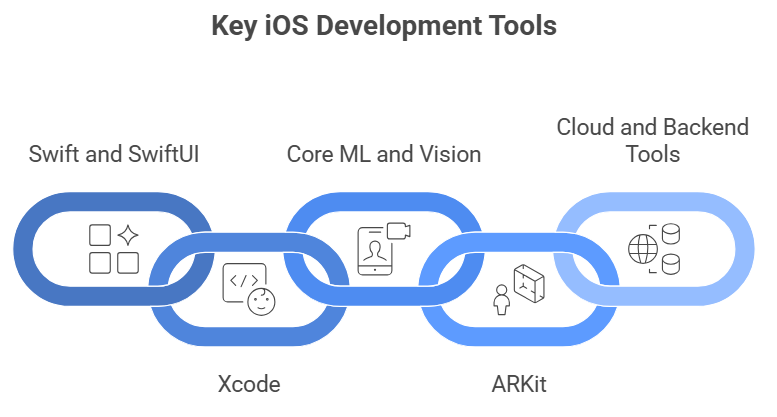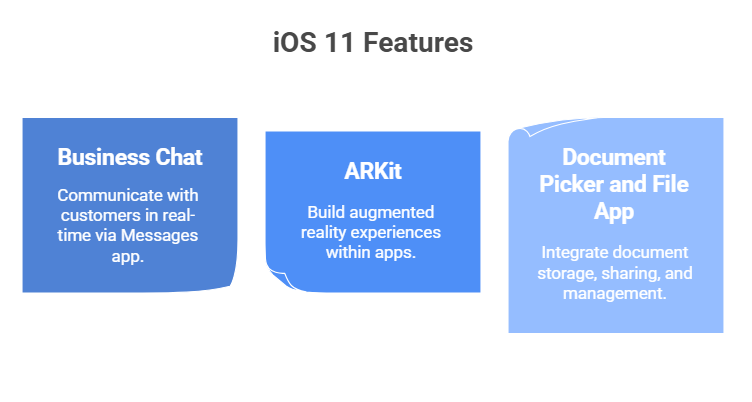iOS App Development: Key Tools, Trends, and Technologies to Follow in 2026
What does the future hold for iOS app development in 2026? As the mobile landscape continues to evolve, businesses must stay ahead of emerging trends and technologies to create innovative, high-performance apps. For companies looking to stay competitive, partnering with a skilled iOS mobile app development company is crucial. From the integration of artificial intelligence and augmented reality to the impact of 5G connectivity, the possibilities for iOS apps are expanding.
In this blog, we’ll dive into the key tools, trends, and technologies shaping the future of iOS app development, offering valuable insights for businesses aiming to build cutting-edge mobile experiences.
The Evolution of iOS App Development
The world of iOS development is evolving rapidly. With each new iOS release, Apple introduces tools and features that make app development more efficient and powerful. As a business, you need to align with these advancements to ensure your app is future-ready, engaging, and optimized for a seamless user experience. An iOS mobile app development company specializing in the latest tools and frameworks is crucial for building apps that meet the expectations of today’s tech-savvy users.
Key iOS Development Tools for 2026
When partnering with an iOS app development company, it’s vital to consider the tools that will help deliver high-quality, scalable apps. As iOS 2026 approaches, developers are leveraging new tools that are more efficient, innovative, and user-centric. Let’s take a look at some essential tools:

1. Swift and SwiftUI
Swift has been Apple’s go-to programming language for years now, and it continues to evolve. It is essential for building high-performance iOS apps, as it offers expressive syntax, memory safety, and automatic reference counting.
SwiftUI is Apple’s declarative UI framework that allows developers to build sophisticated user interfaces with less code. This tool will only become more powerful in 2026, enabling developers to create beautiful, consistent UIs across all Apple devices. With features like live previews and easy-to-manage components, SwiftUI remains a must-learn tool for any iOS developer.
2. Xcode
Xcode is the integrated development environment (IDE) for macOS, making it the central tool for building apps. Xcode’s performance continues to improve, with faster build times, better debugging features, and enhanced support for Swift and SwiftUI. Expect even more advanced features in Xcode as Apple strives to improve developer productivity.
3. Core ML and Vision
As iOS users demand smarter and more personalized experiences, Core ML and Vision are becoming indispensable. Core ML enables on-device machine learning, empowering apps to perform tasks like facial recognition, object tracking, and language translation. The ability to process data directly on the device instead of relying on the cloud offers enhanced privacy, lower latency, and a smoother user experience.
4. ARKit
Augmented reality (AR) continues to be a major trend, and ARKit is Apple’s framework for building AR experiences. From virtual try-ons to immersive training apps, ARKit enables developers to create engaging, real-world experiences on iOS devices. As AR becomes more mainstream, developers in 2026 will increasingly rely on ARKit to build apps that blend the digital and physical worlds seamlessly.
5. Cloud and Backend Tools
For scalable, data-driven apps, cloud platforms such as AWS, Google Cloud, and Microsoft Azure remain popular choices. iOS apps that rely on real-time data, large datasets, or high availability need a robust backend infrastructure. Integration with cloud services also opens the door for advanced functionalities like real-time collaboration and cross-device sync, essential for apps that demand seamless user experiences.
iOS App Development Trends in 2026
Staying ahead of the competition in the app development space means keeping up with the latest trends. The iOS ecosystem is continuously evolving, and businesses need to understand the trends that will shape their apps in 2026.
Artificial Intelligence and Machine Learning
In 2026, AI and machine learning will be at the forefront of iOS app development. With tools like Core ML, Apple enables developers to add AI features directly into their apps. From intelligent personal assistants to image and speech recognition, machine learning will empower iOS apps to provide more personalized, intuitive user experiences.
Augmented Reality (AR)
As mentioned earlier, ARKit is one of the most powerful tools for iOS developers to create AR experiences. As AR becomes more integrated into our daily lives, businesses will increasingly leverage AR to offer immersive experiences that enhance user engagement. Whether it’s in retail (virtual try-ons), education (interactive learning), or entertainment (immersive gaming), the potential for AR is vast in 2026.
5G and Enhanced Connectivity
With the global rollout of 5G, iOS apps will experience faster data speeds, enabling real-time communication and high-definition streaming. For businesses, this means the opportunity to create apps with ultra-low latency, smoother video calls, and more interactive features like live streaming and multiplayer gaming.
Wearable Tech Integration
The integration of wearables such as the Apple Watch will become increasingly important in iOS app development. By connecting apps with wearable devices, businesses can create apps that track health data, enhance fitness experiences, and provide real-time notifications. In 2026, expect more apps to incorporate wearable tech for enhanced user interaction.
Privacy and Security Focus
With user privacy being more important than ever, iOS app developers must focus on building apps that comply with Apple’s stringent privacy guidelines. App Tracking Transparency, introduced with iOS 14.5, is just the beginning. Developers will need to integrate advanced privacy features, such as end-to-end encryption, data anonymization, and on-device processing, to meet the growing demand for data security.
Low-Code and No-Code Development
Low-code and no-code platforms are becoming increasingly popular, and their role in iOS app development will only grow. These platforms allow non-technical users to build and deploy apps with minimal coding, enabling businesses to quickly prototype and test ideas without needing extensive development resources. While this trend won’t replace full-fledged custom development, it will make app creation more accessible.
Blockchain and Web3 Technologies
As blockchain technology continues to mature, Web3 will play a more significant role in iOS app development. Decentralized apps (dApps) and blockchain-based features such as secure payments, digital identity management, and NFTs are becoming more prevalent. For businesses, Web3 opens the door to creating more secure, transparent, and user-controlled applications.
The Impact of iOS 11 Features on Business Development
Apple’s iOS 11 introduced several features that still impact business app development today, and they will continue to influence iOS app design in 2026. Let’s take a quick look at some key iOS 11 features that were game-changers for businesses:

- Business Chat: iOS 11 introduced Business Chat, allowing users to communicate with businesses via the native Messages app. This feature enabled businesses to interact with customers in real-time, providing support, facilitating bookings, and even handling purchases.
- ARKit: One of the standout features of iOS 11, ARKit enables businesses to build augmented reality experiences within their apps. This is particularly useful for industries like retail, real estate, and entertainment, where interactive, immersive content can significantly enhance customer engagement.
- Document Picker and File App: iOS 11 revolutionized file management with the introduction of the Files app and the Document Picker feature. This made it easier for businesses to integrate document storage, sharing, and management directly within apps.
These features, along with improvements in iOS 11’s performance and security, set the foundation for more sophisticated business apps in the years to come. They have paved the way for newer iOS features, and businesses in 2026 should continue to leverage the lessons from iOS 11 to ensure they’re making the most of the latest updates.
The Future of iOS App Development
As we move into 2026, the landscape for iOS app development is brimming with new possibilities. From AI-driven features to advanced AR and 5G-powered experiences, the tools and technologies shaping iOS apps will become more advanced and integrated. Businesses must stay ahead by adopting the latest technologies, keeping up with trends, and working with an iOS mobile app development company that understands the ever-changing ecosystem.
The Bottom Line
The future of iOS app development is filled with endless possibilities, from cutting-edge machine learning features to the integration of 5G and augmented reality. As businesses embrace these advancements, partnering with the right iOS mobile app development company becomes essential to ensure your app is built to last and scale. At App Maisters, we focus on delivering custom, forward-thinking solutions that align with the latest iOS trends and technologies. By staying ahead of these innovations, your business can create an app that not only meets today’s expectations but also sets the stage for the future. Let’s work together to build an app that leads the way into 2026 and beyond.
FAQs
What are the latest trends in iOS app development for 2026?
In 2026, iOS app development trends are dominated by AI and machine learning integration, augmented reality (AR), 5G connectivity, and blockchain technology. These trends will transform user experiences and offer more immersive, personalized, and efficient apps. To stay ahead, partnering with a specialized iOS mobile app development company like App Maisters ensures your business leverages these cutting-edge technologies.
Which iOS development tools will be essential in 2026?
In 2026, the most essential iOS development tools will include Swift and SwiftUI for building native apps, Xcode for efficient app development, and Core ML for integrating machine learning capabilities. Developers will also use ARKit to create immersive augmented reality experiences. Choosing the right tools for your project is crucial App Maisters can guide you in selecting the best tools to meet your needs.
How can AI be integrated into iOS apps for better user engagement?
AI integration in iOS apps helps provide personalized experiences by leveraging machine learning models for recommendations, content curation, and more. With Core ML, AI functionalities can be added directly on the device, ensuring faster processing times and greater user privacy. App Maisters specializes in building AI-driven iOS apps that engage users and deliver valuable insights.
What are the benefits of adopting augmented reality (AR) in iOS apps?
Augmented reality (AR) can significantly enhance user experience by blending digital content with the real world. In 2026, AR will be key in industries like retail, gaming, and education. Apps will allow users to virtually try products, participate in interactive learning, and enjoy immersive experiences. Partnering with an expert iOS mobile app development company like App Maisters will help you integrate AR seamlessly into your app to boost user interaction.
How will 5G technology impact iOS app development?
With the rollout of 5G networks, iOS apps will experience faster speeds, ultra-low latency, and the ability to handle data-heavy tasks like high-quality video streaming and real-time multiplayer gaming. Apps that rely on large amounts of data and require real-time communication will benefit the most. App Maisters helps businesses take advantage of 5G technology to create responsive and real-time mobile apps.
Why is it important for iOS apps to focus on privacy and security in 2026?
In 2026, privacy and security will be top priorities in iOS app development. With stricter data protection regulations and growing concerns about user privacy, iOS developers will need to focus on features like end-to-end encryption, on-device processing, and user consent management. App Maisters ensures your iOS app is built with robust security measures to protect user data and meet compliance standards.
How can blockchain be used in iOS app development?
Blockchain technology is becoming an important aspect of iOS apps, especially for industries like finance, healthcare, and supply chain management. It provides secure, transparent transactions, decentralized identity management, and smart contracts. App Maisters can help you integrate blockchain into your iOS apps to offer enhanced security, transparency, and trust for your users.




















